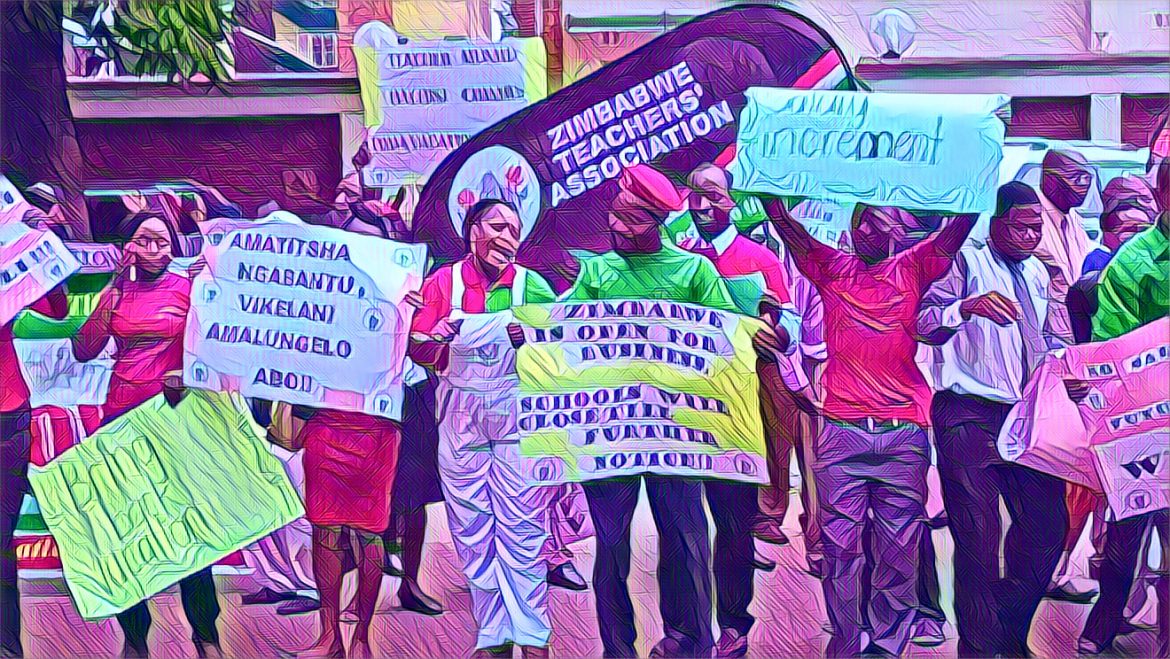The Progressive Teachers Union of Zimbabwe (PTUZ) has openly criticized the Zimbabwean government’s decision to convert the US$300 Covid-19 allowance into a regular salary, labeling the move as a ’tissue of misrepresentation’. This development, announced by Finance Minister Mthuli Ncube during the 2024 National Budget presentation, has sparked a significant debate among the country’s education sector.
While some civil servant groups have praised the government’s initiative, seeing it as a step towards clearer financial structures and a gateway to obtaining salary-based loans from banks, the teachers’ union has expressed strong dissatisfaction. PTUZ President Takavafira Zhou vehemently dismissed these positive sentiments, arguing that the revised salary still falls short of meeting the teachers’ needs.
Zhou’s criticism is grounded in the reality of the economic situation faced by teachers. He noted that the new salary does little to alleviate their plight, considering the array of taxes and financial increases introduced by the Finance Minister. According to him, these fiscal measures collectively burden the workers, likening the situation to ‘slavery’ and ‘primitive exploitation’.
The PTUZ’s discontent stems from the significant discrepancy between current salaries and what teachers used to earn. In October 2018, teachers were receiving a basic salary of US$540, which was unilaterally reduced by the government, a move the union deems as unfair labor practice. Zhou called for an urgent restoration of this previous salary level, along with the payment of a US$80 education allowance and other benefits in US dollars.
Zhou emphasized that salaries should be the product of binding collective bargaining, not unilateral decisions by the employer. He stressed the need for logical disputation, broad engagement, and social dialogue to achieve industrial harmony in schools. The union’s stance reflects a broader discontent among teachers, who feel undervalued and unfairly compensated for their crucial role in education.
This situation in Zimbabwe highlights the ongoing challenges in balancing government fiscal policy with the welfare of public sector workers. The PTUZ’s demands underscore the importance of fair labor practices and adequate compensation for educators, who are fundamental to the nation’s development.
As the debate continues, the government’s response to these demands will be closely watched. The outcome could have significant implications for the country’s education sector and the broader economy. It raises critical questions about the value placed on education and the rights of workers in the face of economic challenges.
The standoff between the PTUZ and the government represents a crucial juncture in Zimbabwe’s efforts to stabilize its economy while ensuring the welfare of its public sector employees. The resolution of this issue will not only impact teachers but also set a precedent for how labor disputes and wage negotiations are handled in the public sector. The PTUZ’s call for a return to the previous wage structure is more than just a demand for higher pay; it is a plea for recognition of the value and dignity of the teaching profession.
The confrontation over wages also brings into focus the broader economic difficulties facing Zimbabwe. The conversion of the Covid-19 allowance into a regular salary, while seemingly a positive step, is perceived by many teachers as inadequate in the context of rising living costs and economic instability. This situation underscores the growing disconnect between government policies and the realities faced by public sector workers.
The government’s approach to this crisis will be pivotal in determining its relationship with public sector workers going forward. An effective response would require not only addressing the immediate salary concerns but also engaging in meaningful dialogue with the unions to ensure long-term solutions that are mutually beneficial.
Moreover, this dispute sheds light on the challenges of post-Covid-19 economic recovery in Zimbabwe. As the nation seeks to rebuild and stabilize its economy, the treatment of public sector workers will be a key indicator of the government’s commitment to equitable growth and social justice.
In conclusion, the dispute between the Zimbabwean government and the PTUZ over teacher salaries is a reflection of larger economic and social issues facing the country. The teachers’ demands for fair wages and better working conditions are a call for respect and acknowledgment of their essential role in shaping the future of the nation. How the government responds to these demands will not only affect the education sector but also set the tone for labor relations and economic policies in Zimbabwe’s journey towards recovery and development.


